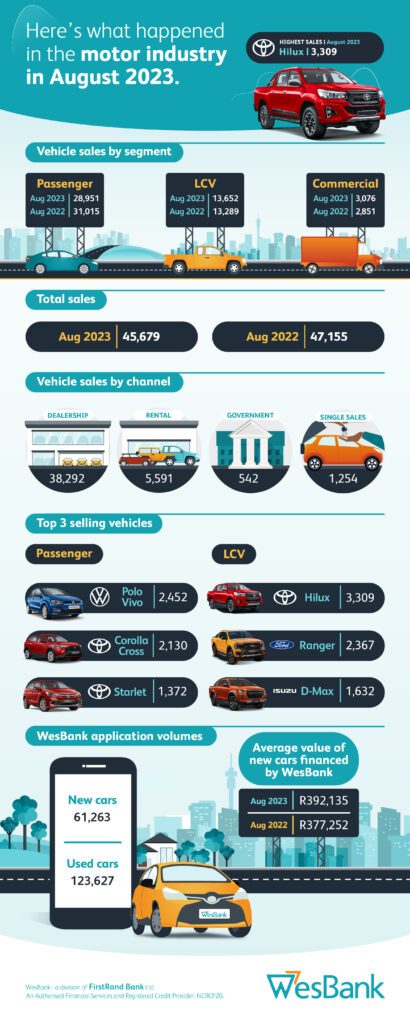In a sign of potential strain in the face of economic challenges, South Africa’s new vehicle sales experienced a stumble in August. Despite the resilience demonstrated in the market amidst tightening household budgets, low business and consumer confidence, and the impact of the energy crisis, new vehicle sales fell by 3.1% to 45,679 units. This marks the largest year-on-year decline in sales since December 2021, according to figures released by naamsa | the Automotive Business Council.
Lebo Gaoaketse, Head of Marketing and Communication at WesBank, acknowledges the decline but emphasises the need for a broader perspective. “August’s negative growth shouldn’t be a cause for complete dismay,” says Gaoaketse. “While it represents the most significant decline in 21 months, it’s worth noting that this volume is still 5.2% higher than July’s sales. Additionally, August 2022 witnessed robust sales, making it a tough comparison.”

Gaoaketse highlights the importance of looking at July’s sales within a context. While there is some cause for concern in a single month’s performance, it doesn’t necessarily indicate a long-term trend. The automotive industry has displayed resilience in its recovery since the pandemic began. Despite challenging economic conditions, consumers have faced budget pressures since 2020, leading to two major trends in car purchasing behavior: a surge in the pre-owned market due to affordability or consumers holding onto their vehicles for more extended periods instead of upgrading.
Within this context, new vehicle sales continued their post-pandemic recovery, influenced recently by the inevitability of replacement cycles and a softer pre-owned market. Lower stock levels and reduced appetite for inflated prices contributed to this shift.
“As a result, while August sales are down by 3.1% compared to a year ago, they cannot be considered poor,” explains Gaoaketse. “In fact, they represent the third-best performing sales month this year, akin to August 2022 sales up to that point.”
Passenger car sales showed relative resilience, with a decline of 6.7% compared to July’s -9.7%, reaching 28,951 units. Notably, fewer of these units were retailed off showroom floors, with dealer channel sales experiencing a 12.4% year-on-year decrease, translating to 80.2% of passenger cars being consumer sales.
In contrast, the Light Commercial Vehicle (LCV) market saw a more favorable outcome for dealers. Dealer sales increased by 9.8% in a segment that grew by 2.7% to 13,652 units, indicating continued appeal for these vehicles in the South African market.
Year-to-date sales have softened following August’s performance, showing a 1% decline and an overall market growth of 3.4% year-on-year. The total sales volume for the year to August stands at 355,246 units.


